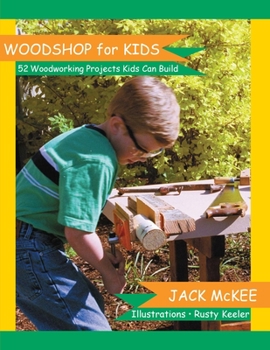Woodshop for Kids: 52 Woodworking Projects Kids can Build
Select Format
Select Condition 
Book Overview
Woodshop for Kids has you everything you'll need to know to get kids (ages 4-12) started using real tools to build real projects. Safety, tools, wood, measuring, hammering, nails and screws are... This description may be from another edition of this product.
Format:Paperback
Language:English
ISBN:1884894534
ISBN13:9781884894534
Release Date:November 2012
Publisher:Hands-On Publishing Company
Length:212 Pages
Weight:1.25 lbs.
Dimensions:0.5" x 8.5" x 11.0"
Customer Reviews
5 ratings
This is a book to help kids through kinesthetic learning.
Published by Thriftbooks.com User , 15 years ago
There are three major learning modalities or styles: visual (through seeing), auditory (through hearing), and kinesthetic (through doing with the hands and body). There was a time that children got to experience all three (and, for sure, there are others but these are the major ones) in school. Unfortunately, the kinesthetic, unless it concerns sports or running around, is being short-changed especially now that schools have dropped off any subjects like the old junior high woodshop and home ec classes. Today it's pretty much visual and auditory--paper work and videos--from preschool through college. This is why I'm particularly happy to see a book like this one. Maybe if we had more opportunities for kids to be active and creative, then we wouldn't have as much trouble "keeping kids in seats." Woodshop for Kids: 52 Woodworking Projects Kids Can Build by Jack McKee with illustrations by Rusty Keeler (Copyright:2005) is a large, non-fiction paperback book aimed at children preschool through elementary school. Or I should say, it's aimed at adults who are working with children to teach them about woodworking, but older children can read the book on their own and follow the instructions. The ultimate production of this book began by Mr. McKee's working on his own home while a stay-at-home-dad to his sons. The boys so enjoyed what he was doing that he enlisted them in some of the projects and taught them about tools. Later, he volunteered to teach children woodworking at his sons' school and was asked to teach some of the teachers how to teach woodworking to the children as young as preschool. His stated purpose in writing this book is to answer the numerous questions that he did not have the time to answer when they were asked by his woodshop participants (parents and teachers). Mr. McKee's writing style is informal but fully developed. He understands and acknowledges that many adults do not have these skills, and he educates them along with the children. However, he does not talk down to either adult or child, and girls are given equal treatment with the boys. Line drawings are useful in explaining points, and numerous black and white photos show finished projects. (If I have one criticism of the book, it would be that there are no color photos except on the front and back covers. I think it would add a lot if color photos inside showed what was accomplished.) He leads one through the safety concerns first, and then goes on to tools. There are cautions on using tools, types of wood to use and avoid (no participle board because of glue and toxins, etc.), changing blades and drill bits, even making some of the tools like a vice and workbench, as well as where to get materials. One part of the book I particularly enjoyed was the Appendix where he teaches how to do "Take-Apart." Kids love to dismantle things--which you probably already know!--so here's their chance to methodically and safely take apart old tape decks, radios, V
More than just woodworking here. A parent's way to empower kids
Published by Thriftbooks.com User , 16 years ago
Jack McKee has written two nonfiction books about ways to teach manual skills to children through building projects: Woodshop for Kids and Builderboards. I proofread his second book and I was stunned by the importance of the book because what he's really offering (along with woodworking projects) is a model for offering respect to children and a way to give them power through safety rules and permission to play. It's a wonderful book. I sent a copy to my grandson, who sleeps with it under his pillow. Janey Bennett, author, The Pale Surface of Things
Woodshop for Kids an excellent choice
Published by Thriftbooks.com User , 17 years ago
I would highly recommend Woodshop for Kids. It not only gives projects that children can do, some with the help of an adult, but it covers what the tools are, what they do and how to care for them. Important information for all budding woodworkers to know.
A guidebook of creative and entertaining woodworking projects that young people can create
Published by Thriftbooks.com User , 18 years ago
Written by Jack McKee and illustrated by Rusty Keeler, Woodshop For Kids: 52 Woodworking Projects Kids Can Build is a thoroughly "user friendly" guidebook of creative and entertaining woodworking projects that young people can create, given age-appropriate adult supervision and guidance. Individual chapters include detailed instructions for 52 different projects, from a marble roll to a sailboat letter holder to a step stool; tips on how to find free wood and use woodworking tools safely; advice on acquiring and woodworking tools appropriate for kids; and much more. 179 black-and-white photos and illustrations round out this helpful and constructive guide to a stimulating, family-friendly activity.
Nurture your child's creativity
Published by Thriftbooks.com User , 18 years ago
As the director of a hands-on museum in Bellingham, Washington, and being the one responsible for selecting books to put on the shelves of our library area, I was immediately attracted to this offering by Jack McKee. I'm always on the lookout for this sort of material, since I like to include information in our library that's in keeping with one of our missions, fostering closer relationships between youngsters and adults. Not only does this book fit well with that aim, but it's a highly useful guide to getting started on building entertaining and useful things out of wood and other common household materials. *Woodshop for Kids* contains information that any parent who understands the importance of teaching manual skills to youngsters will find essential, especially if unaccustomed to teaching. As an adult, it's easy to assume that certain aspects of building things out of wood are intuitively obvious. For example, if you've done a little woodworking yourself, you probably believe that using a saw or pounding a nail is such an obvious act that a child, or even an uninitiated adult, should be able to do it without instruction. Such is rarely the case, especially nowadays when kids start their lives immersed in television and computers, and schools have eliminated such "unnecessary" subjects as "shop" from their curriculums. In America, the old "do-it-yourself" days have vanished in the mists of time. We buy everything, including toys for our children, and we are much the poorer for it. Whether you're an experienced craftsman who wants to teach youngsters how to use tools, or a rank beginner desiring to learn something useful yourself while having some fun with your kids, this is a great book. I've actually recommended that my own staff members read it as a guide to mentoring youngsters or non mechanically-handy adults in workshop practices. The initial four chapters provide an unusually clear discussion of simple woodworking tools, materials, and skills. Simultaneously, it sets a fine example regarding how to present this sort of material to a student, whether child or inexperienced adult. The long fifth chapter of McKee's book devotes itself to a whole list of projects that kids can build or you can build with (or without!) them. They include puzzles, musical instruments, toys, simple scientific demonstrations, and many other interesting things. An appendix includes a tool list, possible sources for them, and how to build a couple useful tools yourself. Instead of buying plastic gadgets that run on batteries for your kids, consider using this book as a guide for working with them to help them learn how they can delight themselves with what they can create with their own two hands. McKee has taught woodworking to youngsters, including his own, for many years. His book is a compilation of his own long experience in the field, and you won't find a better guide to the subject than this one.
Woodshop for Kids: 52 Projects Kids Can Build Mentions in Our Blog

Stuck at Home with Plenty to Do
Published by Ashly Moore Sheldon • March 25, 2020
The threat of COVID-19 has many of us working from home and feeling isolated. This situation can get even more difficult when kids are involved. Here at ThriftBooks, we’ve been exploring some books that offer fun and educational projects for kids while schools and other activities are on hiatus.





